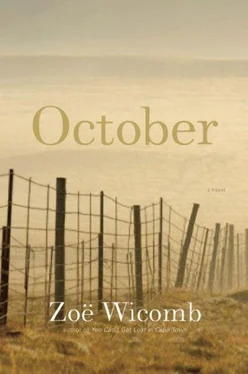Ag ja, Mercia says. She relies heavily on Ag ja. There is little else to say but then, as she bites into the warm bread, she exclaims with delight, It’s sourdough, isn’t it. She had forgotten about the sourdough of her childhood, had believed it to be the invention of metropolitan master chefs. Yes, Sylvie says, if you like you could take back some of my culture in a Tupperware, just add flour and warm water and leave in a warm place. Her voice gathers volume as the emphatic Namaqua speech takes courage from her sister-in-law’s ignorance.
I’ve never made sourdough, Mercia confesses. She knows that this would please the girl. I’ve no idea how to make it, but you can buy a sourdough loaf, expensive it is too, at my local organic bakery in Scotland.
Which surprises Sylvie. She wouldn’t have thought that country bread would be available overseas. It sets her off into explaining how some people use raisins, but that the ordinary potato makes for a much better rising, fermented with less sweetness, although a teaspoon of sugar certainly hurries things along nicely. Look, she says, there’s nothing to it. You boil the water, leave it to cool, but make sure it’s still hand-hot, then put in thick slices of raw potato. I don’t even bother to peel the potato. In three or four days or perhaps five, there should be a gray fermented mess, and only then do you add flour and wait for—
Mercia interrupts. Oh no, what a palaver, that’s way too much trouble. The bread from my local bakery is very good. Even in the olden days my mother only made sourdough when she ran out of fresh yeast. Then we were so far away from shops. No need to go to all that trouble nowadays.
Sylvie looks at her askance. What a strange thing to say after she stayed up the previous night to knead, and rose early to make a fire so that there’d be something warm for breakfast. Well, so much for the blarry woman’s grandness, for all that education. If she does not think that warm roosterbrood is a treat, why does she not at least pretend that it is? That’s what she, Sylvie, would have done. That’s how AntieMa had raised her. What on earth would she have to make for breakfast tomorrow if roosterbrood is not good enough?
Sylvie leans over the door and shouts again for the boy. Ni-icky, she bellows. Blarry child, she’ll kill him for running off like a wild thing. And she notes with something akin to pleasure that Mercia winces at her words, that she stops short of pulling a face.
I’ll go and see Jake, Mercia says, and pays no heed to Sylvie’s anxious attempts to stop her. In the fetid room, she calls his name, but Jake refuses to reply, pulls the cover over his head. When she shakes him by the shoulder he calls out: Leave me alone. My head, I can’t speak. I’ll get up later, when I feel better.
Defeated, she leaves the room.

Jake’s house, at the fringe of the township, is one of a short strip of buildings that peters out into a field. Sylvie says there is talk of further building on the field, which is a shame because she relies on the council renting it out for grazing. Four of the sheep nibbling at the stunted shrubs belong to her. Look, she says, that two-year-old dorper, the Bleskop with the marking on the rear is hers, given to her by Meester — Pa, she corrects herself. And now she has the additional sheep, one of which has just given birth.
In spite of the apparent lack of new spring growth, the lambs are gamboling in that desolate veld, and Sylvie points excitedly at two leaping joyfully over ghanna bush. See, there, right there, she says, those are hers, the ones who now fix their mouths on either side of the dam’s udder, tugging fiercely at her teats whilst their stunted tails wag furiously with pleasure. The dam, poor thing, flicks her ears and stamps with impatience, tries more than once to move away but the lambs, firmly clamped to her udder, draw their feet nimbly, if comically, along and move with her. Only when they relax their greedy grip on the teats does the dam manage a hasty getaway, but with her lumbering bulk the lambs quickly overtake her and clamp their jaws once more to the tired udder.
No escape there, Mercia says with disgust. And they’re so big — should they not by now leave the poor mother alone and graze by themselves?
Sylvie shakes her head. This is her territory, and she delights in the fancy woman’s ignorance. No, man, they’re only a couple of weeks old. And they do graze, she explains, but the lambs still need milk as well, mixed feeding, just like any baby. See how they wag their tails, well babies do much the same — they murmur at the breast, make funny noises when they first start on solids too.
Her thoughts flicker guiltily to Mercia. They really ought to have slaughtered a sheep for her visit. That was what one did in the past when people came from the city, from afar to stay; it was what AntieMa always did at New Year when Ousie came from town. Then it was all go, a whole day of hard work with nothing wasted: the intestines cleaned in order to be stuffed as sausages; the colon, clogged with fat, dried for a crackling fry; tripe and trotters scraped clean with a razor blade; and the salted meat hung out in the evening breeze to dry. Only when the sun rose would it be brought indoors, packed in a basin and left in a cool dark room, covered against the noisy mumbling of blowflies, who would lay eggs and spoil a whole carcass within a day. Then there were the delectable organs that could not be wind dried, liver, heart, kidneys, spleen, sweetbreads, and best of all the special treat of braised brains. Which meant nothing short of feasting, and passing on parts to neighbors, although AntieMa argued against giving anything to Oom Hansie, who sat under the tree; he shouldn’t be encouraged, she said haughtily. But Ousie always managed to wrap up some liver in greaseproof paper for the child to slip to him.
Sylvie assures herself that things are different these days. She could not be expected to lose a whole sheep, what with Jake not eating at all, and the faint guilt dissipates as she thinks of the woman looking down her nose at roosterbrood.
They are standing in silence on the verandahless stoep, where Mercia, not knowing what to do with herself, not knowing how to get away, has turned to a neglected geranium, stooping to pinch off dead leaves.
Ai tog, Sylvie sighs, waving her arm vaguely at the field, it’s not much of a life, nê.
Mercia straightens to look at the girl, whose head is tilted to the sun. It is as if she sees her for the first time, as if, brushing aside the prattle, there is a new face strangely luminous, every fiber lit with sadness.
Is the girl finally going to speak of Jake’s drinking, of his inability to get out of bed? But no, when she turns, once more composed, it is the sheep she speaks of.
Once upon a time, she says, they would have been wild, doing their own sheep thing, and then people came along to domesticate them. Seduced them with ready-made food in winter, and that was the end of them. Fed and fattened so that they have lambs, and then the slaughter.
It transpires that there is no stopping Sylvie when it comes to sheep. Or goats, for that matter. She tells of being just a little girl when she was given her first kid. Funny, it was Oom Hansie, did Mercia remember the old man who used to sit hammering and sawing under the old thorn tree? Dead now from the drink, and a broken heart people used to say, but anyway, he had a nanny goat for milk and it was he who gave Sylvie the day-old lamb, still unsteady on its feet. The dam had died shortly after giving birth and the little thing had to be fed by bottle. How she loved its wagging tail as she held it close. It would suck at her fingers when the bottle was drained and follow her around. Mary, she was, with her little Bokkie, like the English rhyme they recited at school, and sometimes she couldn’t help wishing that he were a lamb with fleece as white as snow. Anyway, he had beautiful brown patches on his neck and on the left, no, she frowns thinking again, it was on the right, all the way down to his foot. Even Bokkie’s droppings were perfectly formed little pellets that smelled of earth and wild thyme — sometimes, musically clattering onto AntieMa’s linoleum — which she hurriedly had to clear away. But then, Bokkie’s time came and there was no arguing with the old girls. Could she not herself be slaughtered instead? she asked AntieMa. She prayed to God, but unlike Father Abraham who was offered a ram caught with its horns in the thicket in order to spare Isaac, God would not provide a substitute for Bokkie.
Читать дальше













